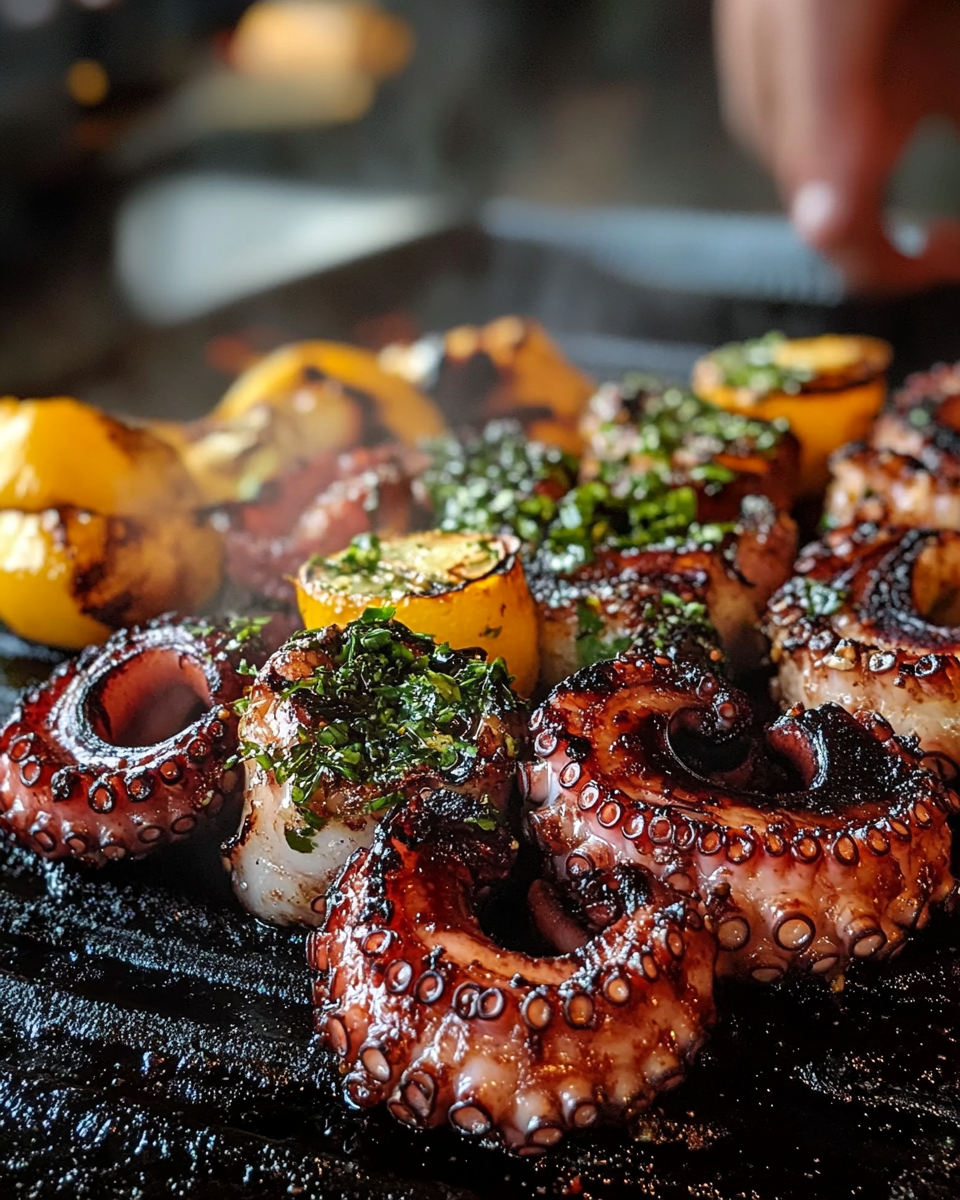Grilled octopus is a time-honored delicacy in Mediterranean and Asian cuisines, prized for its tender texture, smoky char, and rich, oceanic flavor. Once an ancient dish, it’s now a modern favorite among food lovers and chefs alike. When prepared properly, grilled octopus becomes a gourmet showstopper—perfect for impressing guests or enjoying a special homemade seafood dinner.
Full Recipe:
Ingredients
-
1 fresh or frozen octopus (about 2–3 lbs)
-
2 tablespoons kosher salt (for boiling water)
-
4 tablespoons olive oil
-
2 cloves garlic, minced
-
Juice of 1 lemon
-
1 teaspoon dried oregano or thyme
-
Salt and black pepper, to taste
-
Optional: chili flakes, paprika, fresh parsley
Directions
-
Clean the Octopus: Rinse thoroughly under cold water, removing eyes, beak, and internal organs. (Your fishmonger can do this if preferred.)
-
Tenderize by Boiling: Bring a large pot of salted water to a boil. Add octopus and simmer for 30–60 minutes, depending on size, until fork-tender. Remove and let cool.
-
Marinate: Mix olive oil, garlic, lemon juice, oregano, salt, and pepper in a bowl. Place the boiled octopus in the marinade, cover, and refrigerate for at least 2 hours (or overnight for deeper flavor).
-
Grill: Preheat grill to high heat. Place marinated octopus on the grill and cook for 3–4 minutes per side until slightly charred and crispy. Brush with remaining marinade as it cooks.
-
Serve: Slice tentacles and plate with lemon wedges, fresh parsley, and optional side dishes like roasted potatoes or Greek salad.
Nutrients (Per 3.5 oz/100g serving – approximate)
-
Calories: 139 kcal
-
Protein: 25 g
-
Fat: 1.8 g
-
Carbohydrates: ~2 g
-
Sodium: Varies (moderate to high, depending on prep)
-
Rich in: Iron, vitamin B12, selenium, omega-3s
A Culinary Tradition With Ancient Roots
The love affair between humans and octopus goes back thousands of years. In ancient Greece and Rome, it was a common delicacy, often roasted over open flames or stewed with herbs and wine. Today, it’s a beloved staple from the Greek islands to the coasts of Spain, Italy, and even Japan.
In the Mediterranean, grilling octopus is an essential summer ritual. Walk through a Greek harbor town or a coastal Spanish village, and you’re likely to see tentacles dangling from clotheslines, drying under the sun to tenderize before being cooked. This old-world technique underscores the cultural importance of this unique ingredient—and the dedication to cooking it well.
The Science Behind Tender Octopus
If you’ve ever had chewy or rubbery octopus, you know it’s easy to get it wrong. But when cooked properly, octopus transforms into something truly special—firm yet yielding, with a natural sweetness that pairs beautifully with bold Mediterranean flavors.
The secret lies in pre-cooking. Octopus must be boiled before it’s grilled. This step breaks down the connective tissue, making the meat tender. How long it takes depends on the size of the octopus; it can range from 30 to 60 minutes. You’ll know it’s done when you can insert a fork into the thickest part of the tentacle with little resistance.
Once tender, the octopus is marinated in olive oil, lemon, garlic, and herbs—classic Mediterranean ingredients that infuse it with flavor and help it caramelize on the grill. Grilling adds a smoky finish and crispy edges that contrast beautifully with the tender interior.
A Marinade That Elevates Flavor
The marinade used in this recipe is both simple and essential. Olive oil adds richness and helps carry flavor into the octopus. Garlic brings a pungent, aromatic depth, while lemon juice brightens and balances the natural oceanic tones of the seafood. Dried oregano or thyme—both staples of Greek and Italian cuisine—introduce a herbal, slightly earthy note.
Optional additions like chili flakes or smoked paprika can turn up the heat or deepen the smoky undertones, while fresh parsley adds a pop of color and freshness at serving time.
The key to a successful marinade is time. A minimum of two hours in the fridge allows the octopus to absorb the flavors, but an overnight rest delivers the most complex, developed taste. As the octopus chills, the marinade also helps firm up the surface slightly, making it ideal for grilling.
Tips for Grilling Success
Grilling octopus requires high heat and a hot grate. You’re not cooking it here—you’re just searing and caramelizing the exterior. Brush the tentacles with the reserved marinade as they cook to build a beautiful crust and prevent sticking.
Cook the octopus for about 3–4 minutes per side, just until grill marks appear and the edges start to crisp. Tentacles can be grilled whole for dramatic presentation or sliced into smaller sections for easier handling.
If you’re using an outdoor grill, preheat it thoroughly and clean the grates well. If you’re cooking indoors, a grill pan works beautifully, providing those same char lines and smoky essence.
Serving Suggestions for a Coastal Feast
Grilled octopus is versatile enough to serve as a centerpiece or part of a larger spread. Slice the tentacles on a diagonal for a professional look, drizzle with remaining marinade, and finish with a squeeze of fresh lemon.
On the side, keep things light and Mediterranean. Roasted potatoes with olive oil and rosemary, a classic Greek salad with tomatoes and feta, or even a warm lentil salad with red wine vinaigrette all pair wonderfully. For a lighter touch, serve it on a bed of arugula or mixed greens dressed in lemon and olive oil.
To really channel a seaside evening, offer crusty bread to mop up any leftover garlic-lemon oil. A glass of chilled white wine—such as Assyrtiko, Vermentino, or Albariño—completes the experience.
A Dish Worth Mastering
Though it might seem like a restaurant-only dish, grilled octopus is absolutely achievable at home. All it takes is a little patience and attention to detail. Boil it until tender, marinate it generously, and grill it hot and fast for that perfect char.
It’s the kind of dish that elevates a dinner party or a quiet night at home. It tells a story—of Mediterranean traditions, coastal flavors, and culinary craftsmanship. And it proves that sometimes, the most impressive meals come from the simplest ingredients, treated with care and cooked with love.
Conclusion
Grilled octopus is more than just a meal—it’s an experience. From its ancient culinary roots to its place on modern menus, this dish embodies the heart of Mediterranean cuisine: simplicity, bold flavor, and a deep respect for natural ingredients.
With its tender texture, smoky char, and citrusy, garlicky marinade, it delights all the senses. It’s nutritious, elegant, and surprisingly easy to prepare. Whether you’re hosting guests, cooking a special dinner, or just craving something different, grilled octopus delivers gourmet satisfaction with every bite.
Once you’ve mastered this dish, it’s bound to become a favorite. Serve it proudly—and transport yourself to the sun-drenched coasts of the Mediterranean with every tender, flavorful forkful.

